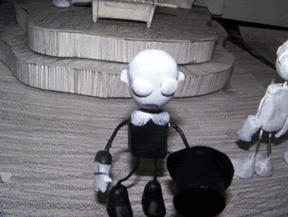I don't believe there ever could be a perfect world in our current state of mind. Humans are problematic. I know it's just a movie, but in The Matrix, Mr. Smith discusses the prototype of the Matrix to Morpheus, telling him of how they first attempted to create a utopia for humanity to keep them complacent, but it was a disaster. No one in the system could agree with it--no one could accept it as reality and outright rejected it. It needed strife to be believable. It needed pain and suffering and misery to be life. I simply can't believe that any one of us could even believe in a perfect world. It'd be the biggest cop-out heaven could ever be. I once heard someone say that she hoped heaven wasn't all white like it was in the movies. Unless our minds were manipulated into adapting to it, then it simply can't be perfect, and that would end up bringing into question whether or not we actually can ever exist in a pristine world as human beings and not as robots or zombies. Still...if we were as happy as we could ever get, we'd still make art. There is always strife. Always. As for the part on experiences, I totally agree. Our own experiences must be made. Yet...what about false experience? What about detached experience? Have you ever heard of the way modern warfare is now being fought with computers and drones? Not completely--it's still in its toddler stages, but there were actually records of the operators of these drones having PTSD, and they're hundreds of miles away from the actual site. I simply find that to be pretty sick.
As for the excerpts, I'm not sure what to say. They were interesting and all, but I'm seriously drawing blanks.
1. Not really. I mean, the video talks about how art cannot be made without strife and the importance of getting your own experience, but the readings are talking about a madman who claims man killed God and how a dead God allows people to be more free to philosophize. It's kind of a long shot, but I suppose the idea that destruction and corruption breeds ideas could be a common link between the both of them. Oh. And the Christian/Catholic themes in the both of them {not so much in the dialogue of the video, but the images}.
2. It helps, but whether it's important or harmful depends on what tenets you're attempting to remove. I do agree that we are often held back from our full potential by old sacraments and moral codes put down years and years ago, but that could be for the better in some cases. Though humans are capable of making very tremendous advancements, they're also just as capable of causing tremendous destruction.
3. Um...I can only really think of examples from movies, if that's not utterly pathetic. But I can't think of any specific examples from history. I /know/ there are quite a few. I'm sure about half of what we work with every day was considered by some fellow in the 19th or 18th century that everyone thought to be completely mad.
4. Yes. When you create art, it is better and best to use your own experiences then to try and mimic those of others. For instance, wouldn't it be completely idiotic, or unethical, for me to try and make a piece about being a soldier in Vietnam based solely on the stories I remember a family member telling me when I was a kid? Maybe one or the other--unless that story kept me from sleeping for many nights and the art wasn't really about Vietnam but about the emotions I felt second hand. Overall, its much better to think of your own point of view than to assume the point of view of others.
5. Like I said in my opening statements, I don't believe there could ever be a perfect world, I can't imagine one, and so I can't imagine whether or not people will make art there. I'll lean towards 'no'--not because of the favor to live in the ideal world versus creating it--but because the only way I can imagine a human being totally content is if they have some sort of lobotomy.
6. Sort of. Like that 'Everything is going to be okay' piece you have? It can only really function in a world where no, everything is NOT okay. Or else what's the point of the statement? What's the point of making it art? So it kind of pertains to the video. I'm not sure how it pertains to the excerpts.
7. Meh. I'm not sure. I make my work because I like to keep myself busy because maybe, just maybe, I'd prefer to forget about real life for a while. So yeah, maybe I make art because of strife. But I know I've made art without it too. I've sat down at restaurants I really like, chipper as hell because I'm going to get a burger or something, and I'm drawing faces on all of the food on the paper place mat in front of me. I draw or create things whenever I feel like it, and sometimes it's far more pleasing than just having it. Like toys. I'll make things out of clay on occasion even if they already exist as toys or dolls. Why? Because I have a greater satisfaction in making my own stuff. It's not because I'm miserable. Not all the time.
8. I hope so.

Hey Sandra,
ReplyDeletewhich Tarkovsky documentary are you referring to? I would be interested to hear more about it. I once made a film about Nietzsche and am an avid Tarkovsky fan.